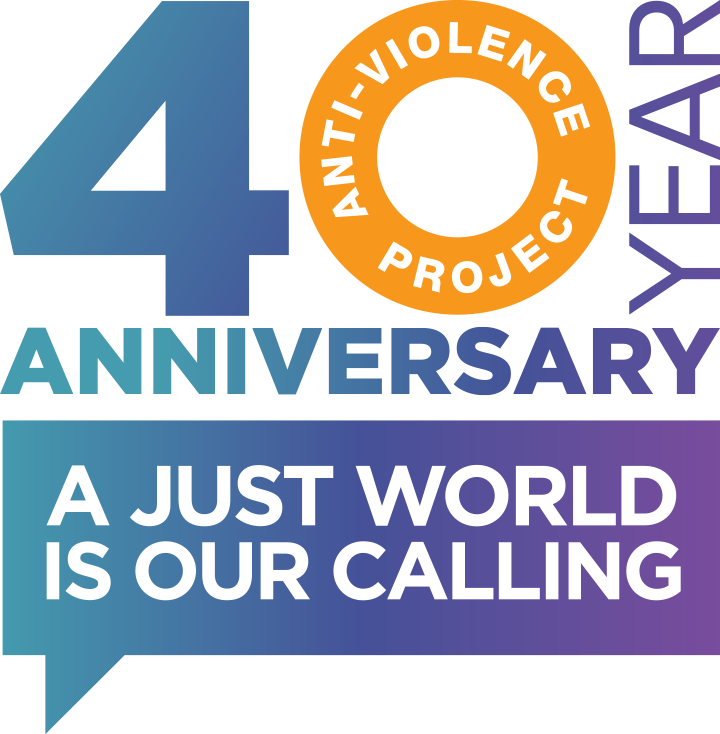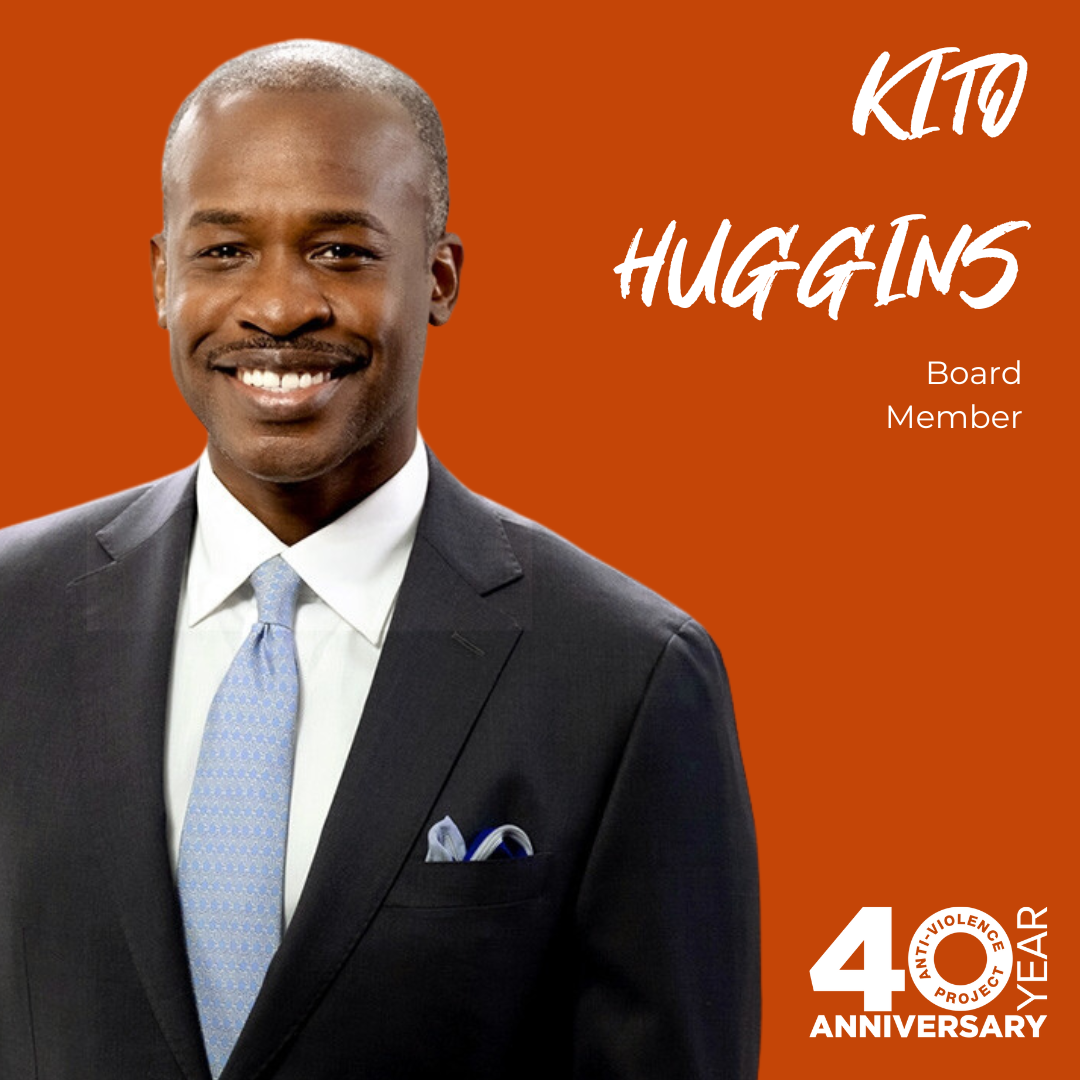
This interview has been shortened and condensed for clarity.
In 1978, Andy Austin moved to New York City’s Chelsea neighborhood and found community in the Chelsea Gay Association (CGA), a social group for gay men. He invited his long-time partner, Michael Sonberg, to join and together, they became founding members of the NYC Anti-Violence Project.
When queer men began to face violent attacks coming to and from the gay bars on the west side of Manhattan, some members of the CGA rallied to support the survivors. As members, Andy and Michael supported the formation of AVP’s hotline by launching a home answering service to support people who had been attacked. Read more about the beginnings of what would become the Anti-Violence Project (AVP) 24/7 hotline for LGBTQ and HIV-affected survivors.
Can you talk about the beginnings and the founding of AVP?
Andy Austin:
AVP grew out of the Chelsea Gay Association (CGA), where I was very involved from the time I moved to Chelsea in about 1978. Of course I was interested, I discovered it and there wasn’t a lot else for gay men in the city at that point. CGA did a lot of community events and offered nice social opportunities. I soon became a member of the steering committee of CGA. I think it was within a year or so after that, probably 1979 if I remember correctly, that there had been a number of incidents, attacks on gay men going to and from the bars along 11th Avenue in Chelsea.
I hadn’t even been to those places at that point, I did later. But they were nasty attacks. We decided to respond. I believe we first started with flyers, to let people in the community know that there was this problem and then before too long, we had a phone number for people to call if they were the victim of an attack. That was kind of the beginning, as part of the steering committee, we made this a project, the anti-violence project, of course.
When you initially put out the hotline number, what was the response when someone would call about an attack?
It was fairly casual, pre cell phones of course, but it was set up so that the calls could be forwarded to one of several volunteers who would be the designated person to receive the calls and would then respond with offers of help with resources. I think there was some, “We can accompany you to the police if you’d like,” that sort of thing.
Michael Sonberg:
CGA was a means of publicizing what the issues were to more people.
Andy Austin:
And the newsletter.
Michael Sonberg:
And the newsletter, because people didn’t know that you shouldn’t walk down NInth Avenue at night.
Are there elements of AVPs work today that you feel connected to?
Andy Austin:
I’m really pleased that AVP continues to exist and serve. Unfortunately we continue to be in a time which is even a little worse in some ways, where taking on the additional issues like domestic partner violence services are really needed, and within our community as opposed to relying on whatever resources are available elsewhere. I think it’s still very important.
Michael Sonberg:
I spent 26 years as a judge, as a criminal side judge. In the Bronx, where I served, they would want to send gay men who were abusive to their partners to stay in a domestic violence program, and you would say to the prosecutor, “that’s not really a good place to send a man who’s in a relationship with another man. He’s going to have to be closeted when he discusses what’s happening or he’s going to get beat up, because he’s going to be sitting in this room with these people who regularly abused women and they’re going to see the fact that he’s an abuser is less important than that he’s queer.” You can’t put them in the room with straight men who have what you might consider similar problems, but they’re really very different problems and it’s not going to work.
AVP was also important because it was the community organizing to take care of itself. Which really hadn’t happened particularly before then. It was a community based group. It was a neighborhood based group. [AVP] saw our need and came to meet it and focused on it. As the need expanded, the mission expanded.
How has the founding of AVP changed your sense of justice or informed it?
Andy Austin:
It certainly made me feel then, and still makes me feel that someone is there for you. That was certainly one element that I know I was very pleased about, AVP really beginning to stand up and say, it’s not okay to beat up gay men on their way to and from bars. It’s not okay to randomly attack people on the street just because you think they’re gay. And honestly, I’m sure on occasion they weren’t even gay they just were assumed as gay.
AVP showed there’s a community of people who will assist when they receive calls, who will assist by having events and programs when there are incidents of violence, and go to communities where people have been attacked and stage protests and handout materials and just be there and make it clear that people are not alone in this.
It says that as we’ve moved along as a society despite some of the things that are still going on today and probably will for a while yet, that there is movement, there’s been a positive change. Certainly I don’t feel uncomfortable walking in that part of Chelsea that was once considered to be really dangerous and you should avoid it at all costs.
Michael Sonberg:
But we might or might not hold hands.
Andy Austin:
Probably not. But we don’t hold hands in a lot of places, we do in some places.
What do you want to see AVP accomplish in the next 40 years?
Andy Austin:
It would be wonderful if there was no longer a need for AVP. I think that’s the ultimate goal. We thought back when we started it, that it was not going to be something that had to be done indefinitely. We’d respond to a situation, to a set of issues and that hopefully there would be no continued need. Except of course as we learned the need was far greater than we might have anticipated from a few local incidents that sparked it to begin with. And that’s how AVP is, as we learned it grew. It’d be wonderful if we lived in a world where people were not attacked or abused for being who they are or being different from others.
Michael Sonberg:
The reality is that even if you put street violence aside, domestic partner violence isn’t about to go away. That’s an inherent part of humanity, unfortunately. People get taught that the way to deal with stresses in their life is to use their fists, or even short of using fists. The other pressures that people do impose, financial pressures on partners, and make threats, and verbal abuse, and shaming people in public, and all sorts of nasty things that people who supposedly care about each other do to each other. That’s not going to disappear. I think what the role that organizations, like AVP, accomplishes is that it sensitizes people to the fact that it’s not healthy to live in a relationship where that’s the norm..
The societal pressures to stay in the relationship are huge, and economic pressures are even more huge, depending on whether the abuser is the moneyed spouse or was the one that had the job and therefore the one with the health insurance.
Andy Austin:
And therefore the one with the control. I would even broaden it to speak about the national convening of anti-violence organizations that AVP has spearheaded. We’re in New York and New York may be a place where things have gotten better in a lot of ways, but that’s hardly necessarily the case everywhere. So I think there will continue to be more. It’s still 40 years, it’d be nice to think things have gotten better.




